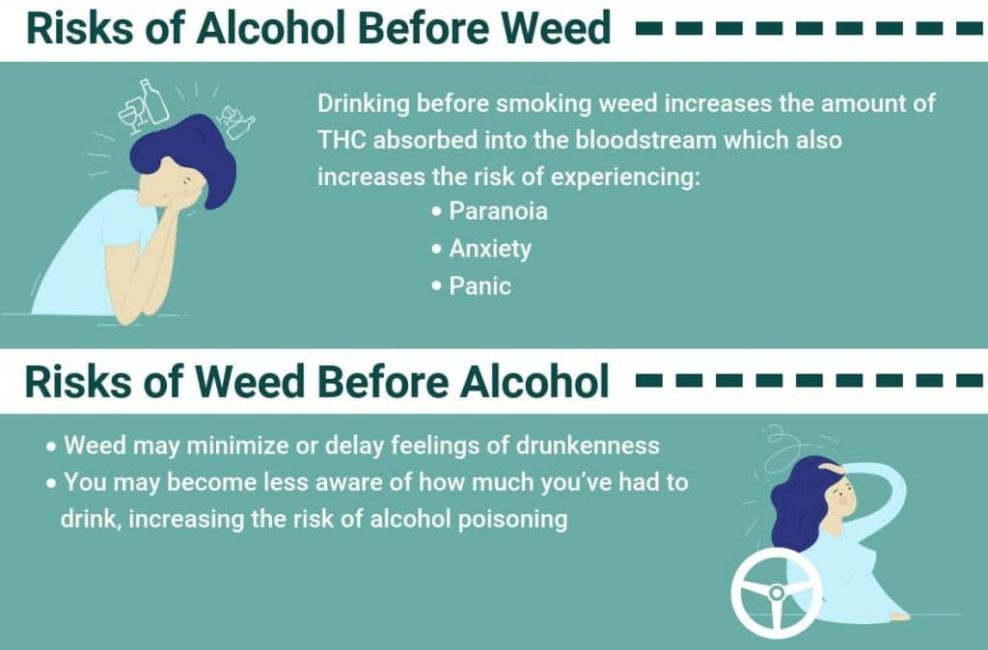
Cannabis vs Alcohol: Which is Safer for Your Health?
Written: editor | October 5, 2023

Effects on the Body
1. Physical Effects of Cannabis
When it comes to the physical effects of cannabis use, it primarily impacts the central nervous system. The main psychoactive compound in cannabis, THC, stimulates certain receptors in the brain, leading to a range of effects. These can include relaxation, altered perception of time and space, increased heart rate, bloodshot eyes, and impaired coordination. Some users may also experience dry mouth and increased appetite, often referred to as “the munchies.”
Unlike alcohol, cannabis does not cause physical dependence or overdose. However, it can impair judgment, coordination, and reaction time, which can be dangerous when operating machinery or driving.
2. Physical Effects of Alcohol
Alcohol is a depressant that affects various body systems, including the central nervous system. When consumed, it is quickly absorbed into the bloodstream and can lead to a range of physical effects. These may include relaxation, decreased inhibitions, slowed reaction time, impaired coordination, blurred vision, and slurred speech. Alcohol can also cause dehydration, dizziness, nausea, and headaches.
Excessive alcohol consumption can have more severe consequences, such as liver damage, cardiovascular problems, increased risk of cancer, and addiction. It is important to note that alcohol can lead to alcohol poisoning, which can be life-threatening.
In conclusion, both cannabis and alcohol have distinct physical effects on the body. While cannabis primarily affects the central nervous system and can impair coordination and judgment, alcohol is a depressant that can lead to a range of physical and long-term health issues when consumed excessively.

Mental and Emotional Effects
1. Psychological Effects of Cannabis
Cannabis, commonly known as marijuana, has been subject to much debate regarding its mental and emotional effects. Research suggests that cannabis use can have various psychological effects, both positive and negative.
One positive effect is its potential to alleviate symptoms of anxiety and depression. Cannabis contains compounds known as cannabinoids that interact with the brain's receptors, potentially reducing anxiety and promoting a sense of calmness in some individuals.
However, excessive cannabis use or using strains with higher levels of THC (tetrahydrocannabinol) can have negative effects. It may lead to short-term memory impairment, impaired cognitive function, and in some cases, increase the risk of developing psychological disorders like psychosis or schizophrenia.
2. Psychological Effects of Alcohol
Alcohol, a widely consumed psychoactive substance, also has significant psychological effects. While it may initially induce feelings of relaxation and euphoria, excessive alcohol consumption can lead to various mental health issues.
Alcohol is a depressant that affects the central nervous system, potentially exacerbating symptoms of anxiety and depression. It can impair judgment, decision-making, and impulse control, leading to risky behaviors and poor emotional regulation.
Prolonged alcohol abuse can also contribute to the development of alcohol use disorder, which is characterized by cravings, loss of control, and physical dependence.
It's important to note that both cannabis and alcohol affect individuals differently, and their psychological effects can vary depending on factors such as dosage, frequency of use, and individual susceptibility. It is recommended to use these substances responsibly, in moderation, and consider the potential risks and benefits associated with their use.

Health Risks and Benefits
1. Potential Health Risks of Cannabis
Cannabis use comes with potential health risks. Smoking cannabis can lead to respiratory problems, including chronic bronchitis and lung cancer. It can also impair cognitive function, memory, and coordination. Prolonged cannabis use may increase the risk of mental health issues such as anxiety, depression, and psychosis, particularly in individuals with a predisposition to these conditions.
2. Potential Health Risks of Alcohol
Alcohol consumption poses various health risks. Regular and excessive drinking can lead to liver disease, cardiovascular problems, and an increased risk of certain cancers. Alcohol abuse can also contribute to mental health issues such as anxiety and depression. Additionally, alcohol impairs judgment and coordination, leading to accidents and injuries.
3. Potential Health Benefits of Cannabis
Cannabis has shown promise in treating certain medical conditions. It can provide relief from chronic pain, reduce inflammation, and alleviate symptoms of chemotherapy-induced nausea. Cannabis compounds called cannabinoids have also demonstrated potential in managing epilepsy and multiple sclerosis symptoms.
4. Potential Health Benefits of Moderate Alcohol Consumption
Moderate alcohol consumption, typically defined as up to one drink per day for women and up to two drinks per day for men, has been associated with potential health benefits. These include a reduced risk of heart disease, ischemic stroke, and certain types of diabetes. However, it's important to note that excessive alcohol consumption negates these potential benefits and increases health risks.
It is essential to approach both cannabis and alcohol consumption responsibly and be aware of potential risks. Individual factors such as age, overall health, and personal circumstances should be taken into consideration. Consulting with a healthcare professional can provide valuable guidance on making informed decisions regarding cannabis and alcohol use.

Legalization and Regulation
1. Cannabis Legalization and Regulation
The legalization and regulation of cannabis have been a matter of debate and change in recent years. As of now, several countries and states have legalized the use of cannabis for medical and/or recreational purposes. The regulations surrounding cannabis vary greatly depending on the jurisdiction, with some implementing strict controls on its production, distribution, and sale, while others have adopted a more liberal approach.
Cannabis legalization has been driven by various factors, including the potential medical benefits of cannabis compounds, the need to address the black market, and the desire to generate tax revenue. While cannabis remains illegal on a federal level in many countries, the trend towards legalization and regulation continues to gain momentum.
2. Alcohol Legalization and Regulation
Alcohol, on the other hand, has a long history of legalization and regulation. In most countries, the production, distribution, and sale of alcohol are tightly regulated to ensure public safety and prevent abuse. Licensing requirements, age restrictions, and taxation are commonly established to control the alcohol industry.
The regulation of alcohol focuses primarily on issues such as preventing underage drinking, promoting responsible consumption, and reducing alcohol-related harm. Governments often implement measures such as alcohol taxation, advertising restrictions, and drunk driving laws to address these concerns.
It is important to note that the regulation of cannabis and alcohol differs significantly due to the inherent differences between the substances. While cannabis is primarily consumed for its psychoactive effects, alcohol has a range of uses, including social, cultural, and medicinal. Additionally, the long-standing legal status of alcohol has led to a deeper and more complex regulatory framework compared to cannabis.
In summary, the legalization and regulation of cannabis and alcohol are complex issues influenced by various factors, including public health concerns, societal attitudes, and economic considerations. These substances are subject to different legal frameworks and regulations due to their unique characteristics and historical context.

Addiction and Dependency
1. Cannabis Addiction and Dependency
Cannabis, also known as marijuana, is a psychoactive drug that is derived from the Cannabis plant. While it is generally considered to be less addictive than substances like alcohol or opioids, it is still possible to develop a dependence on cannabis. Regular and heavy cannabis use can lead to psychological dependence, where an individual may experience cravings and a strong desire to use the drug. However, physical dependence and withdrawal symptoms are rare with cannabis use.
2. Alcohol Addiction and Dependency
Alcohol, on the other hand, is a widely consumed and socially acceptable substance. However, it is one of the most addictive substances available. Alcohol addiction, also known as alcoholism, is characterized by a strong craving for alcohol, loss of control over consumption, and the inability to stop drinking despite negative consequences. Continued alcohol use can lead to physical dependence, and sudden cessation can result in severe withdrawal symptoms, such as tremors, nausea, and hallucinations.
While cannabis addiction and alcohol addiction have their own unique characteristics, both can have detrimental effects on an individual's physical and mental health, as well as their personal and professional life. It is important to seek professional help if you or someone you know is struggling with addiction to either substance.
It is worth mentioning that moderation and responsible use of both substances is crucial for minimizing the risks associated with addiction and dependency. Understanding the potential consequences and making informed decisions is key in maintaining a healthy relationship with any substance.

Social Impact and Perception
1. Cannabis in Society: Changing Perceptions
In recent years, the perception of cannabis has undergone a transformation. It is no longer solely associated with negative stereotypes but has gained recognition for its potential medical benefits and as a recreational option for many. With the legalization of cannabis in some regions, society's view on cannabis has become more accepting and less stigmatized. The shift in perception has led to increased research on its potential uses and a growing number of people using cannabis for various purposes.
2. Alcohol in Society: Cultural Norms and Acceptance
Alcohol has a long history of cultural acceptance and consumption. It is often seen as a social lubricant and a norm in many social settings. While alcohol consumption is legal and widely accepted in most societies, it also comes with its own set of challenges. Alcohol abuse and its associated health risks have been a persistent issue, leading to accidents, addiction, and other negative consequences.
Comparing the social impact and perception of cannabis and alcohol, it is clear that attitudes toward cannabis are changing more rapidly due to greater awareness and shifting regulations. While alcohol maintains its cultural acceptance, the potential benefits and uses of cannabis are being explored and recognized. However, it is important to note that both substances should be used responsibly and in moderation to ensure the well-being of individuals and society as a whole.

Conclusion: Cannabis vs Alcohol
Despite ongoing debates and varying opinions, it is important to approach the comparison between cannabis and alcohol with an open mind and an understanding of the different effects and potential risks associated with each substance. Ultimately, the decision of which is better depends on individual preferences, health considerations, and legal regulations in different jurisdictions.
Which is Better
When it comes to comparing cannabis and alcohol, there is no definitive answer as to which is better. Both substances have their own distinct effects and potential benefits and risks.
Alcohol has long been a socially accepted and legal intoxicant, but it carries the risk of addiction, liver damage, and other health issues. It can also impair judgment and coordination, leading to accidents and risky behavior.
On the other hand, cannabis is increasingly being recognized for its potential medical benefits and has been legalized in many jurisdictions for medicinal and recreational use. However, it can also have negative effects such as impaired memory, anxiety, and dependence.
Ultimately, the choice between cannabis and alcohol should be made based on individual circumstances, preferences, and careful consideration of the potential risks and benefits. It is advisable to use either substance responsibly and in accordance with the laws and regulations of your jurisdiction. Consulting with a healthcare professional or seeking reliable information from reputable sources can also help make informed decisions about substance use.



